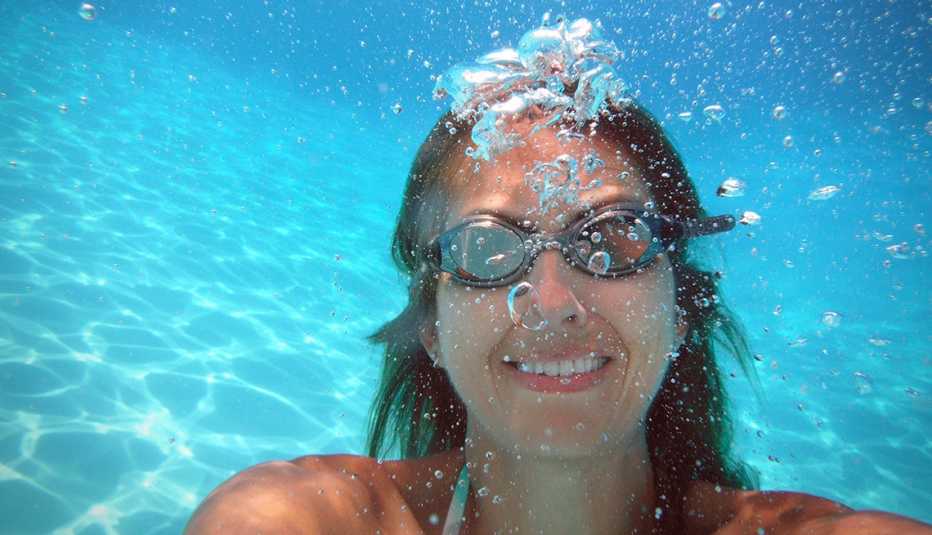AARP Hearing Center


Signs of an eye infection
Worried about your eyes in the water? Here are the typical symptoms of an eye infection:
- Redness
- Pain
- Discharge that is yellowish or mucuslike
- Vision problems
- Light sensitivity
- Swelling
- Excess tearing
- Feeling like you have something in your eye
Source: Cleveland Clinic
It's get-out-in-the-sun season: Grab a beach towel, slather on the sunscreen, and order a big drink with a tiny umbrella. But before you get in the water — whether it's a pool, lake or ocean — grab some goggles.
Don't have a pair? Then you should probably keep those peepers closed when swimming below the surface.
Exposing your eyes underwater to whatever gunk may be lurking there raises your risk for a range of health issues. Some things are relatively benign: For example, if you keep your eyes open in the pool for too long, they can become red and irritated. But there are more severe effects, too, such as a higher risk for waterborne infections — especially if you wear your contact lenses underwater (don't!) or have been treated for cataracts.
1. Lakes, rivers and oceans carry risks of infections
"If you swim in water that is not chlorine-treated, like a river or a lake, you're at a greater risk for developing an eye infection,” says Robert C. Layman, an Ohio-based doctor of optometry and president of the American Optometric Association.
Bacteria can infect an irritated eye, leading to “a serious sight-threatening infection, often called a corneal ulcer,” he adds, which is an open sore on the cornea that can cause severe pain and lead to blindness if not treated.
One parasite, in particular — called Acanthamoeba, which is found in lakes, rivers, marshes and oceans, but can also be in pools and hot tubs — can wreak havoc on the eyes and cause a rare but “devastating type of infection,” called Acanthamoeba keratitis, Layman explains.
Catching it early is key since it can be treated with prescription eye medications. However, more severe cases may require a corneal transplant; it can even lead to blindness or require surgical removal of the eye, Layman adds. People who wear contact lenses are most at risk for this type of infection.
Signs of an eye infection
Worried about your eyes in the water? Here are the typical symptoms of an eye infection:
- Redness
- Pain
- Discharge that is yellowish or mucuslike
- Vision problems
- Light sensitivity
- Swelling
- Excess tearing
- Feeling like you have something in your eye
Source: Cleveland Clinic
2. Pools have hidden dangers, too
However, pools — even those that are properly disinfected — can also present hazards for open eyes. The chemicals themselves — chlorine, bromine — can cause irritation and redness, plus they don't get rid of every single contaminant.
"Keep in mind that people in pools rub their eyes more and that can cause corneal abrasions, which can lead to infections,” Layman adds.
It's just like anything else you should probably avoid: The more you expose yourself to it — in this case, waterborne chemicals and contaminants — the worse you feel.



































































More on health
Germs in the Pool: A Survival Guide for Swimmers
Chlorine kills most pathogens, but parasites, bacteria and viruses can still lurk below surface
5 Things to Know Before Going to the Pool This Summer
Expert advice on swimming pool safety as the coronavirus pandemic wears on
Top 10 Age-Related Eye Problems
Early detection can keep you seeing clearly